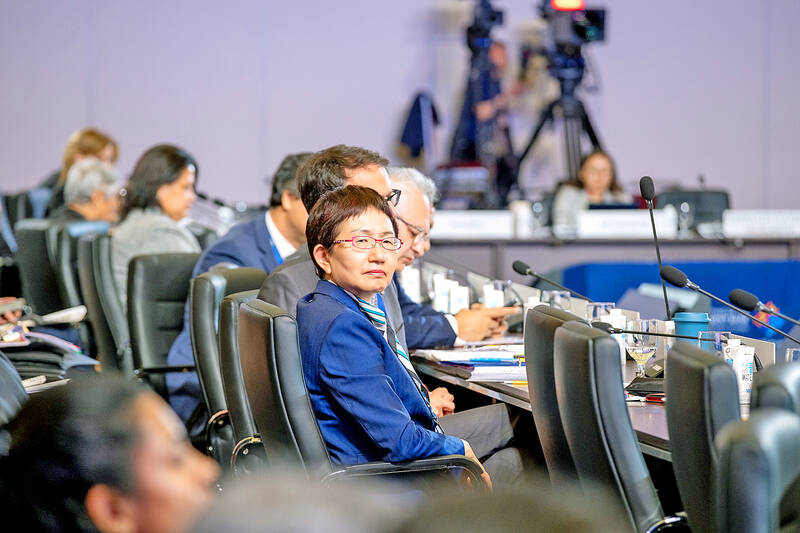Minister of Finance Chuang Tsui-yun (莊翠雲) protested Taiwan’s designation as “Taipei, China” at the Asian Development Bank’s (ADB) annual meeting, the Ministry of Finance said yesterday.
A ministry official in Chuang’s delegation to the meeting in Incheon, South Korea, said by telephone that Chuang repeated Taiwan’s demand to correct the name and voiced “our disagreement over the unilateral alteration of our membership designation.”
Established in 1966, the bank is owned by 68 members, with 49 from the region. Chuang serves as a board governor.

Photo courtesy of Asian Development Bank
Taiwan was one of the bank’s founding members, but it has been called “Taipei, China” since 1986, when the People’s Republic of China joined the bank.
Chuang protested the designation during her speech, saying that Taiwan has fulfilled its obligations and responsibilities as a member of the bank, the ministry said.
She urged ADB member nations to respect each other and allow Taiwan to participate in the bank’s activities on an equal footing.
On its Web site, the Manila-headquartered bank says that Taiwan has provided it with US$1.54 billion in capital as of Dec. 31 last year, and has also contributed or committed US$133.43 million to the bank’s special funds since becoming a member.
A total of 1,102 goods, works and related service contracts worth US$1.51 billion, and 83 consulting contracts valued at US$49.67 million, have been awarded to contractors, suppliers and consultants from “Taipei, China,” the Web site says.
The annual meeting was held from Tuesday through Friday under the theme of “Rebounding Asia: Recover, Reconnect and Reform.”
The ministry official said that Chuang discussed a range of topics at the annual meeting, with a particular focus on climate change, regional cooperation and gender equality.
She urged the bank to make stronger and more effective efforts to build climate resilience for environmentally vulnerable developing member countries, such as small island states, the official said.
Chuang also stressed the importance of bolstering domestic resource mobilization among developing member countries to improve their capacity to collect taxes and other revenue to provide better public services and economic support.
Regarding gender equality, Chuang said that Taiwan has been ahead of its peers on the issue and was willing to share its experience with its partners.
Chuang and central bank Deputy Governor Chu Mei-lie (朱美麗), who is Taiwan’s alternate governor to the ADB, are next to attend the 63rd annual governors’ meeting of the Central American Bank for Economic Integration (CABEI) in the Dominican Republic from Thursday to Saturday.
Chuang is to participate in her capacity as a governor at the CABEI, the ministry said.
Taiwan joined the CABEI in 1992 under its official Republic of China name as a non-regional member, with an 11.09 percent stake in the bank, the highest among the body’s seven non-regional members.

The CIA has a message for Chinese government officials worried about their place in Chinese President Xi Jinping’s (習近平) government: Come work with us. The agency released two Mandarin-language videos on social media on Thursday inviting disgruntled officials to contact the CIA. The recruitment videos posted on YouTube and X racked up more than 5 million views combined in their first day. The outreach comes as CIA Director John Ratcliffe has vowed to boost the agency’s use of intelligence from human sources and its focus on China, which has recently targeted US officials with its own espionage operations. The videos are “aimed at

STEADFAST FRIEND: The bills encourage increased Taiwan-US engagement and address China’s distortion of UN Resolution 2758 to isolate Taiwan internationally The Presidential Office yesterday thanked the US House of Representatives for unanimously passing two Taiwan-related bills highlighting its solid support for Taiwan’s democracy and global participation, and for deepening bilateral relations. One of the bills, the Taiwan Assurance Implementation Act, requires the US Department of State to periodically review its guidelines for engagement with Taiwan, and report to the US Congress on the guidelines and plans to lift self-imposed limitations on US-Taiwan engagement. The other bill is the Taiwan International Solidarity Act, which clarifies that UN Resolution 2758 does not address the issue of the representation of Taiwan or its people in

US Indo-Pacific Commander Admiral Samuel Paparo on Friday expressed concern over the rate at which China is diversifying its military exercises, the Financial Times (FT) reported on Saturday. “The rates of change on the depth and breadth of their exercises is the one non-linear effect that I’ve seen in the last year that wakes me up at night or keeps me up at night,” Paparo was quoted by FT as saying while attending the annual Sedona Forum at the McCain Institute in Arizona. Paparo also expressed concern over the speed with which China was expanding its military. While the US

SHIFT: Taiwan’s better-than-expected first-quarter GDP and signs of weakness in the US have driven global capital back to emerging markets, the central bank head said The central bank yesterday blamed market speculation for the steep rise in the local currency, and urged exporters and financial institutions to stay calm and stop panic sell-offs to avoid hurting their own profitability. The nation’s top monetary policymaker said that it would step in, if necessary, to maintain order and stability in the foreign exchange market. The remarks came as the NT dollar yesterday closed up NT$0.919 to NT$30.145 against the US dollar in Taipei trading, after rising as high as NT$29.59 in intraday trading. The local currency has surged 5.85 percent against the greenback over the past two sessions, central